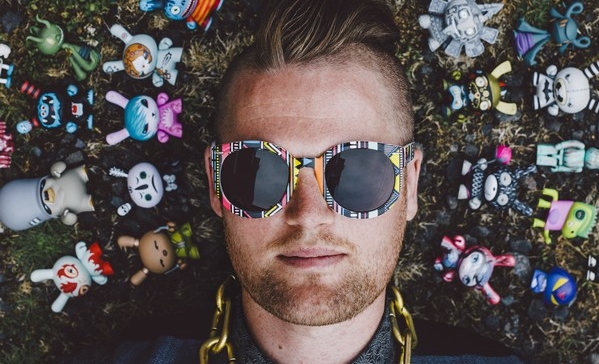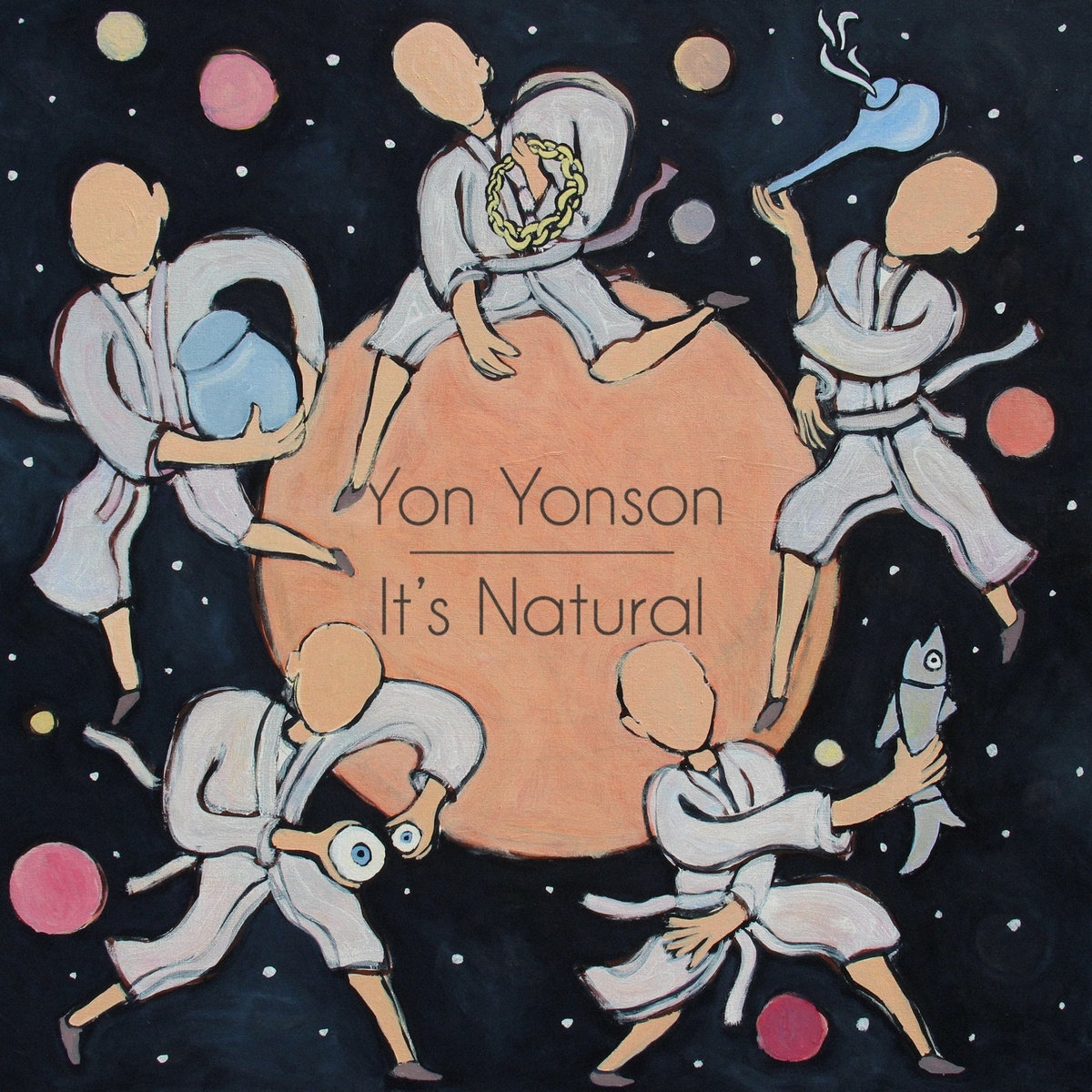Opiuo, aka Oscar Davey-Wraight, was born at the very tip of the South Island of New Zealand in a small country town called Motueka. You could almost argue he was born into the festival scene, as his parents used to lease their land to music festivals in New Zealand. From a young age, he was exposed to an enormous variety of sounds, from Bob Marely to Herbie Hancock and everything in between, and he credits his parents as being hugely supportive of his choices. “There were loads of festivals on their land,” he says. “The Orinoco music festival. It was very social, [there were] lots of parties. That was in the early days of electronic music, like Salmonella Dub; an electronic-ish feel with four drums on the floor. It led on to Contrain and then The Gathering in the ‘90s. I went to those as a kid. I was really young and here was this phat round sound. It was awesome.”
Robo Booty, from his debut solo album Slurp and Giggle, was the song that took Davey-Wraight from cult-status to gargantuan in 2010. With things moving at light-speed, there’s not much time for him to reminisce about the days when he studied landscape design.
“I got into music organically, played drums, piano, then I started DJing with my own songs. People liked them, people kept asking me to do them and I kept going.” No need for a day job, then. “I spend my life touring the world; I went to seven or eight countries last year. I released an album last March. It had a successful I pledge campaign and I toured that album for six months.” That album was Meraki, which was a finalist for Best Electronica Album at the New Zealand Music Awards and from there he claimed five UK Glitch/Hop awards. The evidence stacks up, and it doesn’t stop there. Davey-Wraight sold out his tour of Canada last year and his Soundcloud page has over five million views.
He’s also enjoyed number one status on Beatport, Additech, and iTunes, with his album Slurp and Giggle as the most downloaded album of 2010 from additch.com, and it was also nominated for the Australian Music Awards Best Dance/Electronic Release. Talk about a high achiever.
“I’ve worked with some brilliant instrumentalists,” Davey-Wraight says, with names like MC Hammer, Pretty Lights and Bassnectar to name just a few, and he’s also done remixes for Gwen Stefani and Kimbra. With Mexican guitarist Albino, who he met years ago at Rainbow, the duo went on to work on a series of albums together known as Sun Monx. He’s also appeared at The Producers’ Conference at the Revolt art space, sharing tips on making music.
So, needless to say life’s pretty good for the Motueka-born, who’s now based in Melbourne’s northern suburbs. Word-of-mouth was what brought him to Melbourne: “I’d lived in Wellington and Auckland and this was the next step,” he says. “I had friends here and they told me it was happening musically, but moving here wasn’t necessarily [only] a music thing.”
Davey-Wraight’s well aware he’s living the dream and talks about his success with extreme modesty. “It’s quite surreal that this is what I do for a living,” he says and he’s generally unconcerned with making an impression: “I don’t want to be famous or feed my ego. I’m having a good time. I’m really lucky; I play what I play, do what I do.” In grappling with newly-found fame, he says there’s that inevitable inner-conversation about keeping the ego in check and to remained unspoiled by success: “There are definitely those moments when I think, ‘I still have to be me’,” he contends. Keeping it fresh, for him and for the audience is his motto and he’s constantly six months ahead of himself. “I follow my nose [and] keep myself challenged,” he says. His definition of what constitutes a successful night is simple: “If you go to a party and someone rocks the dance floor,” he says. “It depends on the crowd. It varies. Different dance floors can all be different worlds. Outdoor festival audiences tend to like trance and Psy. You have to get a good groove on. I know when you dive into a track, into a vibe and when it fully drops and that’s when you lose it and you just go. Most electronic music triggers something in you,” he adds. “There are various ways of giving an organic feel to an electronic sound, ways of creating a phat round electronic sound. Good cross-over with live guitar and synthesiser. Music is aural pleasure. It transports you. It takes over and you’re gone.” Although he does what he likes, these days Opiuo is besieged with requests from punters, insisting he do one song or another: “I’m one of the bigger people in the Australian festival scene. You’re expected to do your thing.”
‘Soulful and playful funky glitch’ is one of the ways his sound has been described, and he admits he’s a little unsure of where he sits in the electronic music scene. “I do my own thing. It’s an original kind of sound, most of the time it’s a funky music sound that’s bass-heavy, with a bass lead melody. My music has a driving bass beat. [But] I’m not into techno or trance.” Davey-Wraight reckons there’s too heavy an emphasis on specificity when it comes to genres in the world of electronic music, and when there’s too much talk about genres, you face the risk of limiting yourself. “I’m not locked into anything,” he says and, despite himself, it may be that he’s unwittingly created his own genre. “People are calling other music ‘Opiuo,’ they’re saying things like, ‘It sounds like, quite Opiuo.’ I didn’t create it. People will interpret music their own way. I’m not too set on any one thing. The beauty is that what I do can fit into anywhere in the scene in Australia. It’s not necessarily techno or house or trance or chill out.” He contends the festivals taking place here hold their own in a global context, and Australia is leading the way with outdoor festivals. “So many people do so many different things. I just like music. The thing with electronic music is that it’s been perfected before it reaches your ears.”
Clearly Davey-Wraight is simply out to have the best time exploring what he can do, with technology, with various instruments, with or without other people and he’s blithely unconcerned with how his sound is received, so long as people are having a good time. As something that’s rather refreshing in the realm of electronic music, Davey-Wraight’s determined to not take himself too seriously. “At the end of the day, music is what it is. Mine hasn’t got too much meaning; it means something to me probably, but I’m not making any statements. It’s not taken too seriously. Musicians can be aspired to, be looked up to, they can have that power. But I don’t treat my projects as anything more than musical adventures. Have fun. Be silly. Get down and have a good time.”
BY LIZA DEZFOULI

